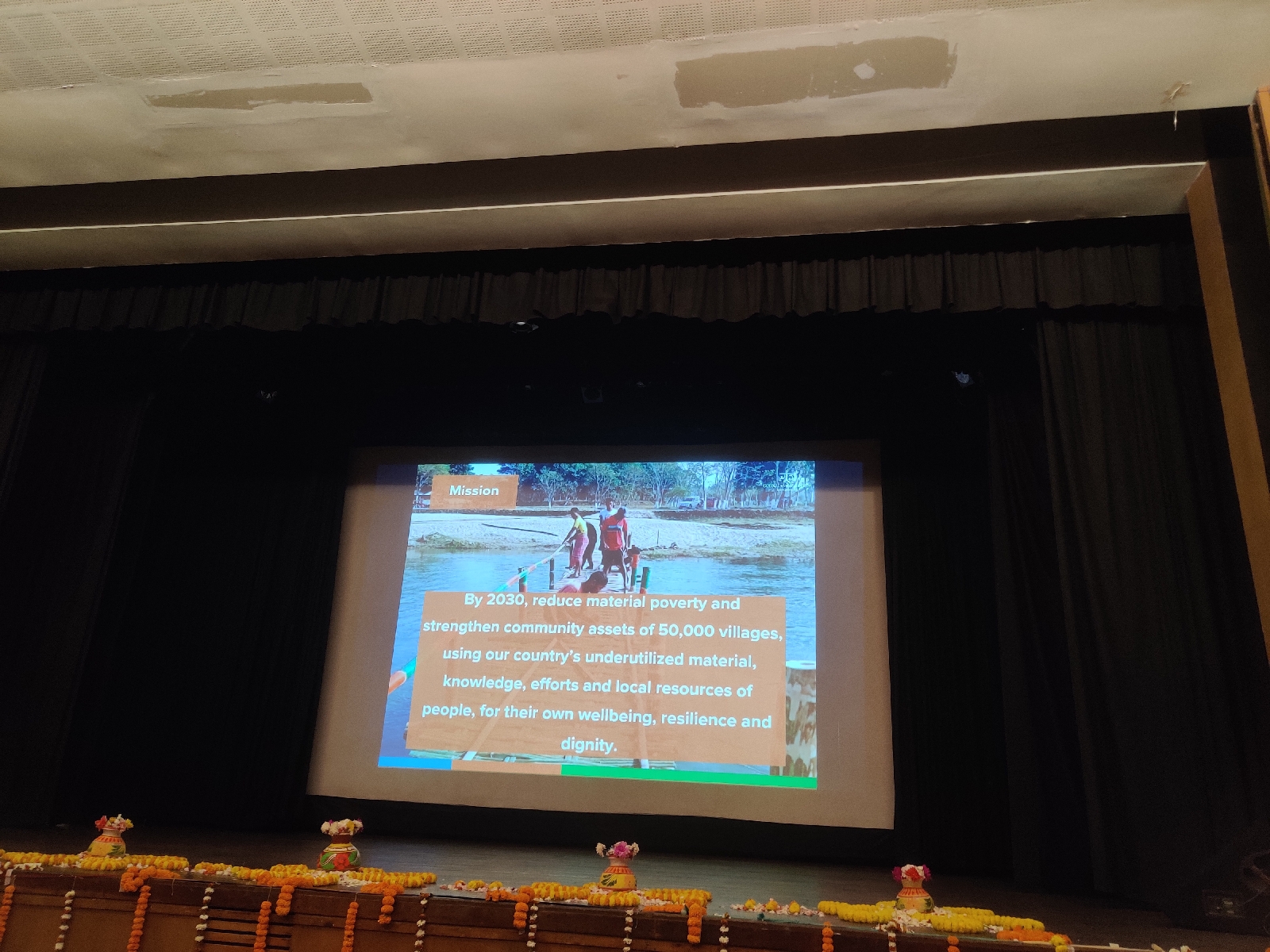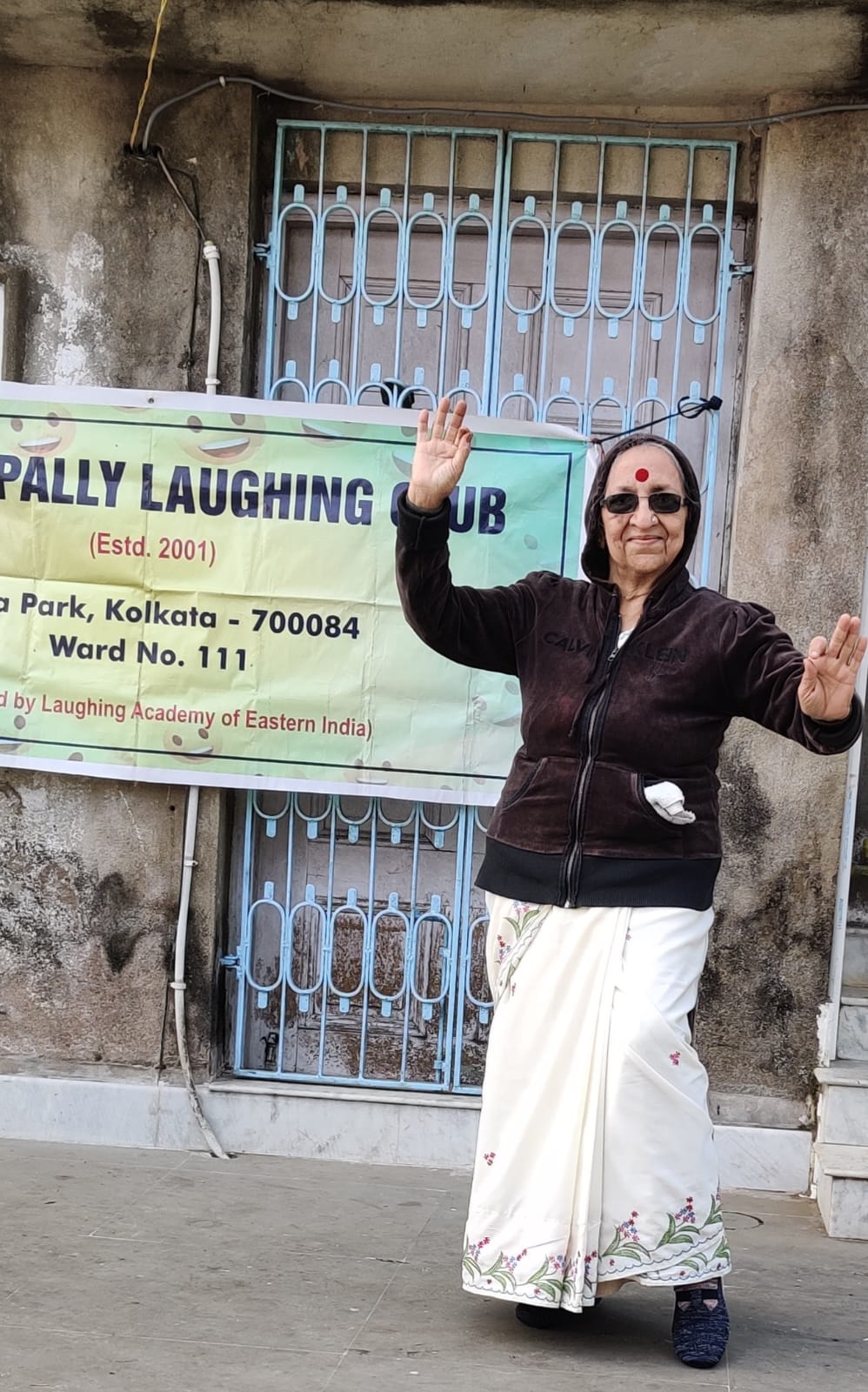Friday, 9 May 2025
The man and his mind
Saturday, 5 April 2025
Don't help, but support!
I am only one, but I am one. I cannot do everything, but I can do something. And I will not let what I cannot do interfere with what I can do.
Edward Everett Hale
Why a non-governmental organization (NGO) called Goonj would call an annual Chaupal was intriguing. Recently, in Kolkata, I, Sudeshna Chatterjee, attended the event which opened up a Pandora’s Box as it exposes the hollowness of some stakeholders.
Goonj works across the country as a disaster relief and rural development organization. There is a Harvard Business case study on it. What I personally find uplifting is that it abhor the word ‘donor’. The NGO considers itself as a stakeholder in empowering communities and amplifying the voices of the marginalized. As it rightly points out, there is a difference between help and support.
Here are some reality checks which by its definition are not always palatable. It is 'we' vs 'they' to start with.
People usually give out what they don’t want. They would not bother to find out what is required. The thought and word, ‘donation’, demeans dignity that everyone is born with. Rather, they could have been a catalyst to any form of developmental work to make an individual, school or community self-sufficient. For example, it could be guidance to become a small scale entrepreneur, creation of a playground or revival/ management of a waterbody. Large part of India still has good source of water. What is lacking is water management.
Just like landfills are dumped with garbage, to some, unfortunately, it seems the NGOs are similar equivalents. I learnt stained pads, torn and unwashed clothes are also ‘donated’. They don’t have any qualms about giving unwashed trousers that don’t have zips or pajamas that don’t have drawstrings.
There were misdirected advertisements pronouncing using cloth during menstruation as unhygienic. But even clothes can be made hygienic for the usage, that they don’t say, instead urging the target audience to buy more expensive branded pads. Goonj, for example makes much cheaper and hygienic cloth pads. It can be bought and given to needy. Or, donate clothes to enable them to make some more.
Empathy should not be misplaced. For the same sexual abuse, why a culprit of a homosexual victim is sentenced for six months to two years whereas the sentence becomes seven to fourteen years when the victim is heterosexual?
I have come across prominent reports of certain communities not getting rents in his/her chosen place. But where do you see LGBTQ people suffering from similar predicaments?
One transgender spoke of the absence of a neutral washroom. All the lavatories are marked either 'Gents' or 'Ladies'. Hence at public places, he has to resist the urge enough to develop kidney stones!!
Villagers may not always be as educated as their urban counterparts, but they are street smart and the grassroots wisdom often works.
Also, for women, going by some Goonj female staffers, a village is safer than a city.
Inspired to join? You don't need to be a MSW (Master in Social Work) to join an NGO. Engineers and MBAs (Master in Business Administration) also work at Goonj.
How many of us think laterally? For example, now that Covid thankfully is a past, there are many unused oxygen concentrators across hospitals and even at many homes. These could still be much help to people with severe breathing problems. Laundry bags at hotels and car seat covers could also be used for various requirements.
Chaupal etymologically means a space to converse and connect in a rural set-up where the people are essentially male. Happily, I saw a liberalized version of that concept in a city cultural centre at Kolkata where a large number of the audience were women. They were students, volunteers and well-wishers. In fact, Goonj itself has almost 76 percent of women force. It was a day full of real-life stories, concerns and conversations, projects and possibilities, disaster photographs decoding harsh truths with dry humour, a few counters of Goonj products for sale and a good lunch.
When the light shifts, things look different. Thank you Goonj, for hosting this platform and challenging our preconceived notions.
#Goonj #Chaupal #LGBTQ #Transgender #SudeshnaChatterjee #Covid
Saturday, 8 March 2025
Breaking Boundaries
A woman is like a tea bag - you never know how strong she is until she gets in hot water. There is nothing she cannot achieve. She is a celebration of life. She dreams, and she conquers because girls with dreams become women with vision.
Eleanor Roosevelt

Sarika Halder
Remember the Billy Ocean song: When the going gets tough, the tough get going. And if it is with a hearty laugh, the journey becomes heartening. I met such a toughie in the fag end of January, this year, while hiring an Uber cab in Kolkata. From behind the wheel, she gave me a shy smile, trying to anticipate my reaction. I was pleasantly surprised and the next 45 minutes ride was wrapped in conversations that made me feel good for this year’s International Women’s Day pledge for an inclusive, fair and empowered society.
Meet Sarika Halder, 32, my cabbie that afternoon. She was driving confidently. We spoke mostly when the car was stuck in a traffic jam. She had to live separately from her husband because of her problems with her in-laws. Her husband was not ready to shift with her. She did not insist either. Over two years now, she has been living with her nine-year-old daughter and mother. Earlier, she had been working as a nanny for infants. But she was not a celebrity nanny. Looking for this job every second year with decent salary could be difficult, she thought. So, for a work profile with more openings, she started learning to drive, thanks to her friend who connected her with a non-governmental organization(NGO). For eight consecutive months, she would learn driving during day time and work as a nanny at night.
With the hard work she had invested, she passed her driving test as well as saved some money. Along with a bank loan, she bought base model of a Wagon R, costing Rs 5.9 lakhs. She knew the risk of taking a loan, but she was determined to draw a better curve for herself and her dependents. She is required to pay Rs 10,000 per month for four years to repay her loan. She is so fiercely independent that she is paying back her husband in instalments, a sum of Rs 2000 that she took as a loan from him. In some time, she plans to learn driving tempo and bus. She also aims to complete her matriculation. She has studied till class VIII.
She has been driving since the last six months. She takes a hearty breakfast in the morning and drives the whole day till 11 pm at night, almost on empty stomach. Just a cup of tea and biscuits and that too only twice a day. She avoids eating from outside. When asked about her experience, "no untoward incident. Not even, when the passenger in the front seat is a male”, she had said. She was all praise for Uber, police, male cabbies and passengers in that order. Because, while some passengers are nice, some are not so nice. Few are plain rude. They would either disconnect when she replied to a booking call or cancel the ride when they discovered her behind the wheel. But she was dismissive about such irreverent attitude.
Ditto with a meter reader who visited my premise yesterday. Since she did not want to be identified, I will go by her pet name, Pratima K. Mine comes under the ambit of Calcutta Electric Supply Corporation or CESC. When I asked her about her experience, she was candid. "Nothing negative to cry over. Yes, few residents were condescending. They were rather shocked to see me when I rang the bell for the first time, doubting my capability". But like Halder, she was nonchalant.
Beauty, I learn, is no longer skin-deep. Rather, it is quality conscious. In the process, what evolved is grit. That is why, when I met 78-year-old widow and a grand mother, Bulbul Bose, I was mesmerised by her spirit. A music teacher and kirtankar by profession, she loves to dance and can gyrate to all the Helen numbers for over an hour at a stretch!!
Bulbul Bose
I find their courage infectious, especially in today's time when the scope and depth of abusive behaviours have expanded. They may or may not always get the support of the company they work for. But, they no longer dither to walk that extra mile to earn their place with dignity. And it can be any city. With the celebration of 'Feminism' today, thanks to all the media paraphernalia and advertising blitzkrieg for an 'Equal Tomorrow', it is women like Sarika Halder, Bulbul Bose and Pratima K who take up the baton. Especially, when you see how they take on key challenges and grab emerging opportunities in a cut-throat market place, you know, women are no longer 'second sex'. In fact, today, notwithstanding the patriarchal symbols in rituals and male gaze, women of any age show the zest to live life on their own terms.
Better still, they are no longer few in number and limited in certain brackets. They are ambitious, confident, gentle, cheerful and go-getter. They live by choice and shun compulsion. This is the India I am comfortable and proud about.
Happy Women's Day!!
#EleanorRoosevelt #Feminism #CESC #BillyOcean #SudeshnaChatterjee #malegaze #Uber #EqualTomorrow
Saturday, 26 October 2024
The Weaver Bird
Sunday, 14 January 2024
Why Consciousness matters?
Thursday, 7 December 2023
Visual Voyage
Visual Voyage
You don’t take a photograph,
You make it.
Ansel Adams
The making of our workshop
Sight and Sound
Late last month, on a Saturday morning, participants in a workshop huddled under a Neem tree in a corner of a sprawling campus of Rashtrasant Tukadoji Maharaj Nagpur University (RTMNU), Nagpur, Maharashtra. Amidst cool breeze and soft light, poetry and song, film theorist Amrit Gangar, kept changing their visuals in quest of better imagery. His sessions spelt magic. A day before, at the break of dawn, the participants were made to give their one minute visual and metaphoric interpretation of a tree in a single shot taking unimpeded creative liberties. Their films were screened before an unique three-member jury, Sapna Khandare, Kalpana Waghade and Kuldeep Hatwar, all from the housekeeping team of RTMNU. Few participants were asked to translate an English poem into Hindi and Marathi and then recited together, celebrating narrative fluidity and the power of sound. I, Sudeshna Chatterjee, have never seen such a workshop before where image and sound were explored with such felicity. Where untold stories were captured with such elan and empathy. My work was to document this workshop.
Minds and Issues
A seven-day workshop on basic photography turned a hobby into a passion for most participants. Titled, ‘Through The Lens’, it was a photo-sensitization programme for students and faculties from colleges and universities by the Maharashtra State Faculty Development Academy (MSFDA) in collaboration with Photography Promotion Trust (PPT). The purpose, was to visually engage these 26 participants coming from 15 districts across Maharashtra for exploring the inter-connected and multi-layered academic spaces in Nagpur.
The workshop emphasised hands-on training which means several hours (about ten hours per person) of taking images for four days with digital cameras and expert inputs. Technical aspects and creative features were detailed out with images, documentaries and short films.There were celebrated guest lecturers who through their knowledge, wisdom and footages imparted the third dimension of this creative art. The inhouse experts include Padmashree awardee and veteran media photographer Sudharak Olwe, visual artist and film-maker Nirman Chowdhury and multimedia journalist Riya Behl. At every level, there were constant interaction among participants, visiting faculties and resource persons. It culminated in an exhibition of photographs taken by the participants and is displayed at the Nagpur University campus, for the next one month.
The participants were from the age-group of 20-66 years. The diversity was also seen in their chosen disciplines. There were professors of Zoology, Physics, Geography, Education and Multi Media and Mass Communication. Similarly, there were students from Computer Application, Applied Arts, Photography et al. The issues that they confront with their cameras include socio-economic and cultural challenges faced by the students, student-teacher relationships, freedom, safety and hierarchy in institutional spaces and education for holistic development. Their enthusiasm was infectious and continuous. One participant, Nitin Marskole even put up an act while framing his shots. He used slow shutter speed to express the anxiety of a student when results are declared. There was theatre artist Akshay Khobragade who acted in a one minute film, which was directed and scripted by two other participants and won the coveted first prize. Another participant Jennifer Barla showed me her digital page on face painting. She along with her team members won the second prize. So much colour and variety, the atmosphere was both electric and eclectic.
Perspectives and Images
With not much prior experience in professional photography and visual storytelling, the participants under the guidance of PPT members and other experts, by their own admissions learnt the meaning and power of an image that could transcend into visual narrative and shake our collective conscience. As one participant maintained, when he was watching Sudharak Olwe's presentation of the migrant workers, malnutrition, and abuses of women, it shocked him. “When the pictures of my home state, Uttar Pradesh were shown, it was something I knew. The problems and the conditions. But what shook me was the strength of the picture and the story that it held. I started hearing and seeing all the news that I have been through in the past years”, said Nilay Surya Srivastava.
Walking amidst familiar surroundings and yet reflecting upon untold stories and zooming on unseen pictures were the challenges of this workshop. Like this painful sight of damaged books in a college library due to a sudden flood this year in September. Like an English-speaking educated labourer’s son who decides to drop-out looking at his graduate unemployed father and got into menial jobs. Like the camaraderie between students and watchman as they sit together for lunch.
So yes, the contents include techniques and aesthetics, but, the participants were essentially taught to think, be aware, be patient and focus deep. Things that are not even in the periphery of our conventional education system. With clearer and stronger perspectives, images start talking. Hopefully with the thrust of New Education Policy (2020) on experiential learning, things will be better.
Looking at the images clicked and may be, because of a mix of generations, thwarted the apprehensions shared by the portrait guru Pramodbabu Ramteke with yours sincerely who gave a delightful talk on the principles of a painter that were even respected by the eminent resident of Rashtrapati Bhavan! On the sideline, he was pointing out how today’s generation was less patient and do not think deep. “You have to be one with the Art”, goes his signature line.
Most of the participants and resource persons were residing in the campus and therefore the interactions were free-flowing and would extend even during the meal times. The food, a wholesome vegetarian spread with Nagpur favourites and sweets and rounds of tea/coffee with biscuits, is an important marker of a successful workshop specially when held residential. The care, concern and promptness of MSFDA officials were particularly praiseworthy. The elements of reduced safety and heightened hierarchy which have become quite rampant in academic spaces were happily missing in our campus. All of these for just Rs 1000 (non-refundable) perhaps is the best part of the story.
Frame by frame from participants
Thoughts and Afterthoughts
Beside becoming ambitious as a career photographer, I never realised that photography workshop could be of such interest even for science teachers in the group. They said it will help them take better pictures of the specimens for classroom teaching.
There was a pertinent question from Riya Behl on how do one evaluate the efficacy of a workshop. The articulate Pratik Dhamal from MSFDA touched on the qualitative modes of evaluation rather than the quantitative counts. Participant Balaji Maske and a student of Wilson college, Mumbai, had a searching question post the workshop: If I follow a Tiger throughout the day, and photograph it, will it be called a Documentary Photography or Wildlife Photography?!
Interestingly, a city that doesn’t boasts of a single standard art gallery, hosting a quality photo exhibition in a nondescript space speaks volumes for the efforts of the organisers. The photographs are displayed till the end of this month. May be, when you visit this exhibition, beside shifting your perspective, it could also make you want to be part of a similar workshop as the winter closes in. Because being a summer country, joining well-rounded workshops during winters make the learning that much more joyful.
Since, my blog is not a paid endorsement, the emotions shared here are not commercially crafted.
All the pictures here are courtesy Sudharak Olwe, Nirman Chowdhury, Riya Behl and participants of this workshop
#workshop#throughthelens#msfda







